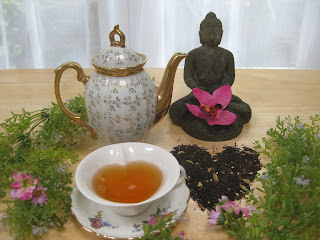
Stressed, over worked, everyone wanting a piece of you? At boiling point? It's time for a break!
A real tea break we mean. Learning the art of taking tea may just you offer more than you think.
Did you know tea is said to have almost 10x the amount of antioxidants found in fruit and vegetables? Antioxidants protect your body from physical damage caused by mental or emotional stress. They reduce signs of aging, help lower blood pressure and cholesterol, are great for the skin and boost immunity.
Tea also contains an amino acid found in its highest concentration in green tea, called l-theanine which is proven to reduce anxiety. When consumed with small amounts of caffeine (a combination only found in tea) keeps us alert while maintaining a sense of calm, without the jitters and the instant hit you get from a cup of coffee.
L-theanine stimulates Alpha brain activity, scientifically known to be induce a meditative state - relaxed but effortlessly alert and able to tackle tasks. Studies show it can improve mood, reduce stress and help keep us focussed for longer periods of time as well as improve mental clarity. This can take affect within 20 minutes and can last up to 5 hours.
Hint: Take a tip from a Buddhist monk – next time you need to work out the world’s biggest problem, reach for a cup of green tea. It might just give you the solution, or at worst make you feel like you can.
Words and photo contributed by Suzi van Middelkoop
Certified Tea Master and owner of Tea by the Sea

